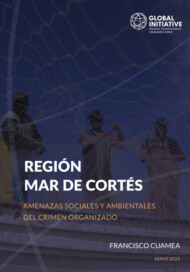Assassination of Mexican fisheries leader casts a long shadow, signalling organized crime’s expanding grip on the country.
In October 2024, the Mexican Institute for Research in Sustainable Fisheries and Aquaculture honoured the legacy of Minerva Pérez, an outspoken leader in Mexico’s fishing industry, murdered three months prior. This public recognition came with a powerful message: the industry called on authorities to pursue justice and not let her murder go unpunished.
On 8 July 2024, Pérez had given an interview to the press as part of her role as the head of Mexico’s fishing industry chamber. Hours later, she was shot by unidentified gunmen as she drove away from her office in Ensenada, Baja California. She died in her car from fatal wounds to her torso and head. According to authorities, the killers had been following her and knew her route. More than 30 bullet casings were recovered from the crime scene.
Pérez’s murder sent shockwaves through Baja California, her home state. While the state is known for its rich marine resources, it has become a battleground where criminal organizations prey on communities and local industries. Violence in Baja California has surged to the point where it is now one of five ‘priority states’ for the new administration of President Claudia Sheinbaum, who faces an uphill battle to curb crime in regions heavily affected by organized crime and extortion. In the final month of outgoing President Obrador’s term and the beginning of Sheinbaum’s, authorities reported a drop in violent crimes such as homicides. However, extortion – the crime that Pérez had openly denounced as an insidious threat to the country’s fishing industry – remains rampant.
Pérez was the first woman to lead the fishing industry chamber and was also a member of the Mexican Council for the Promotion of Fishing and Aquaculture Products, a civil society organization dedicated to promoting the consumption of Mexican fish and seafood. She was the director and CEO of Atenea en el Mar, a seafood company she founded that specialized in shellfish harvesting, and owned other businesses.
Those who knew her remember Pérez as a courageous leader who often spoke out against illegal and unfair practices in the fishing industry. In her last interview, she called for more oversight by the authorities to curb illegal fishing of high-value species, such as lobster and abalone. ‘We need more surveillance from [the national fisheries authority] along the coasts,’ she said. ‘Illegal fishing supplies the same market as legal products, but bypasses all the production costs.’
This was not the first time Pérez had spoken out against illicit practices in the industry. In the months before her assassination, she had publicly spoken out against cartels demanding extortion or protection payments from boat and truck drivers, seafood restaurants and vendors. In February 2024, she spoke to the media about the rising incidents of extortion and racketeering. She explained how criminals had started by threatening the owners of fishing vessels, but had soon extended their extortive practices to the entire supply chain. ‘We see this across the sector – from small producers working to put food on the table to restaurant owners navigating the challenges of growing a small business,’ she said.
Over the past decade, criminal organizations have steadily expanded their presence around the Gulf of California, reaching the Mexican states of Sinaloa, Baja California Sur, Baja California and Sonora. Sources interviewed for this article agreed, off the record, that the cartels are involved in every stage of the seafood production chain – from ocean to table.
But who exactly are these cartels? In Mexico, identifying specific groups is complex, as criminal organizations, law enforcement, politicians and private-sector actors are all deeply intertwined in this intricate criminal network. For example, reports following the arrest, two weeks after Pérez’s murder, of Ismael ‘El Mayo’ Zambada, the long-standing leader of the Sinaloa Cartel, suggested that politicians were involved in a web of connections that led to his kidnapping in Sinaloa by a rival faction leader and subsequent detention in the US.
Over the years, Mexican criminal groups have amassed significant resources and firearms, aided and abetted by corrupt interests, and confident in their impunity. These drug cartels have diversified their illicit activities, and have expanded into the illegal fishing of endangered species such as totoaba and other high-value marine fish. They have forged commercial relationships with criminal organizations in the US, China and other countries involved in international wildlife trafficking. These groups have also become illegal traders, dictating prices to fishermen and processors, threatening the livelihoods of fishing communities, the industry and the region’s biodiversity. In addition to these illegal activities, organized crime groups are attempting to infiltrate and monopolize legitimate fishing businesses.
To enforce their interests, a wide range of actors are involved in orchestrating assassinations in Mexico, and as these criminal organizations have grown in power, violence targeting those who investigate or expose organized crime and corruption has undoubtedly increased.
The motive for Pérez’s murder has yet to be confirmed, and the public prosecutor’s office initially pursued four lines of investigation. Two of these related to her exposure of the Sinaloa Cartel’s extortion practices and issues relating to illegal fishing. The other two lines of inquiry involved business relationships and personal matters. The authorities say that they are not ruling out any possibilities, but the chances of this case ending in impunity are high, as Mexico’s justice system is rife with fabricated truths.
Emma (not her real name), a fisher and activist, shared her sense of fear: ‘I feel a strong connection with her. How long did men lead [the fishing industry chamber] without anything happening? No one ever spoke up. Were the men complicit in the corruption that’s been brewing all this time, letting it flourish? And now, when a woman steps up and says, “I’m different”, she’s silenced like this?’ For her, the message is clear: ‘Don’t rock the boat.’
Impunity and organized crime are major threats to the legal fishing industry, jeopardizing its sustainability and economic viability. When criminal groups operate with minimal consequences, they engage in illegal practices that deplete and pollute marine resources, destabilize legitimate international markets and intimidate local communities, depriving them of opportunities. This situation puts law-abiding actors at a severe disadvantage and increases the risk to those who dare to speak out. Minerva Pérez’s murder highlights the pressing need for more effective measures to combat crime and corruption, and for better protection for those who expose criminal activity.
To build resilience within the fishing industry, Mexican authorities must focus on strengthening the prosecution of cartelized supply chains, promoting transparent legal processes within the industry, and protecting the leaders and activists who are essential to the community’s defence against organized crime. These steps are critical to breaking the cycle of violence and impunity that threatens to destabilize Mexico’s fishing sector – one that is not only an economic backbone, but also a key part of the cultural identity and social fabric of the country’s north-west region.
Emma recalls the day Pérez approached her at a conference. Hailing from a small fishing community, Emma was nervous about speaking at her first major event, while Pérez was an industry heavyweight. Pérez offered her words of encouragement, reminded her that they both came from fishing families and offered to help. For Emma, Pérez’s assassination feels all too personal. For the fishing industry, it was designed to send out a warning not to make waves. For the Mexican authorities and the international community, Pérez’s death is as a stark reminder that justice and protection for those who challenge criminal forces must be prioritized to prevent the nation from sinking further into impunity.
«No hagan olas»
El asesinato de una líder pesquera mexicana deja una huella profunda, reflejando el creciente control del crimen organizado en México
En octubre del 2024, el Instituto Mexicano de Investigación en Pesca y Acuacultura Sustentables organizó un reconocimiento póstumo a Minerva Pérez, líder de la industria pesquera de Baja California. A tres meses de su asesinato, este homenaje vino acompañado de un mensaje contundente: el sector hizo un llamado a las autoridades para que se haga justicia y su asesinato no quede impune.
El 8 de julio del 2024, Pérez había ofrecido una entrevista a la prensa como parte de sus funciones al frente de la Cámara Nacional de las Industrias Pesquera y Acuícola (CANAINPESCA) de México. Horas más tarde, fue acribillada por hombres armados no identificados mientras salía de su oficina en Ensenada, Baja California. Falleció en su automóvil debido a las heridas de bala en el torso y la cabeza. Según las autoridades, los asesinos habían estado siguiéndola y conocían su ruta. En el lugar del crimen se recuperaron más de 30 casquillos de bala.
El asesinato de Pérez conmocionó a Baja California, su estado natal. Aunque el estado es conocido por sus ricos recursos marinos, se ha convertido en un campo de batalla donde las organizaciones criminales se aprovechan de las comunidades y las industrias locales. La violencia en Baja California ha alcanzado niveles alarmantes, convirtiéndolo en uno de los cinco estados prioritarios para la nueva administración de la presidenta Claudia Sheinbaum, quien enfrenta una ardua batalla para reducir la criminalidad en las regiones más afectadas por el crimen organizado y la extorsión. En el último mes del mandato del presidente Andrés Manuel López Obrador y el inicio del de Sheinbaum, las autoridades informaron de una disminución de los delitos violentos, incluyendo homicidios. Sin embargo, la extorsión, delito que Pérez había denunciado abiertamente como una amenaza para la industria pesquera, registró un aumento.
Pérez fue la primera mujer en presidir la CANAINPESCA y también era miembro del Consejo Mexicano de Promoción de los Productos Pesqueros y Acuícolas, una asociación civil dedicada a promover el consumo de pescado y marisco mexicano. Fue directora y consejera delegada de Atenea en el Mar, empresa que fundó dedicada a la exportación de productos pesqueros, y propietaria de otros negocios del sector.
Quienes la conocieron recuerdan a Pérez como una líder valiente que solía denunciar las prácticas ilegales e injustas en el sector pesquero. En su última entrevista, pidió mayor vigilancia de las autoridades para frenar la pesca ilegal de especies de alto valor, como la langosta y el abulón. «Necesitamos más vigilancia de Conapesca [Comisión Nacional de Acuacultura y Pesca] en las costas», afirmó. «La pesca ilegal llega al mismo mercado al que llega el producto ilegal, pero sin todos los costos de producción».
Esta no era la primera vez que Pérez denunciaba prácticas ilícitas del sector. En los meses previos a su asesinato, se pronunció públicamente contra los cárteles que exigían extorsiones o cobro de piso a lancheros, camioneros, restaurantes y vendedores. En febrero del 2024, declaró ante los medios de comunicación que el sector había sufrido casos de extorsión. Explicó cómo los delincuentes habían empezado amenazando a pangueros y lancheros, pero pronto extendieron sus prácticas extorsivas a toda la cadena de suministro. «Estamos lidiando con eso en el sector: desde el pequeño productor que está tratando de llevar el pan a su casa, hasta el restaurantero que está luchando con un emprendimiento para empezar a crecer en un pequeño local», afirmó.
En la última década, las organizaciones criminales han expandido su presencia en el golfo de California, llegando a los estados mexicanos de Sinaloa, Baja California Sur, Baja California y Sonora. Las fuentes entrevistadas para este artículo coincidieron, bajo anonimato, en que los cárteles controlan todas las fases de la cadena de producción de mariscos, desde la captura en el océano hasta la venta final.
¿Pero quiénes son exactamente estos cárteles? En México, identificar grupos específicos es complejo, ya que el crimen organizado, las fuerzas de seguridad, los políticos y actores del sector privado están profundamente entrelazados en esta red criminal. Por ejemplo, tras la detención, dos semanas después del asesinato de Pérez, de Ismael «El Mayo» Zambada, exlíder del cártel de Sinaloa, surgieron informes que implicaban a políticos en una red de conexiones que llevaron a su secuestro en Sinaloa a manos de Joaquín Guzmán López, hijo de «El Chapo» Guzmán, y a su posterior detención en Estados Unidos.
A lo largo de los años, los grupos criminales en México han acumulado recursos y armamento, respaldados por intereses corruptos y confiados en su impunidad. Estos cárteles han diversificado sus actividades y han ingresado en la pesca ilegal de especies en peligro de extinción como la totoaba y otros peces de alto valor. Han establecido relaciones comerciales con organizaciones delictivas en Estados Unidos, China y otros países involucrados en el tráfico internacional de especies. Estos grupos también se han convertido en comerciantes ilegales, que dictan los precios a pescadores y procesadores, amenazando los medios de subsistencia de las comunidades pesqueras, la industria y la biodiversidad de la región. Además de estas actividades, los grupos de crimen organizado intentan infiltrarse y monopolizar los negocios pesqueros legítimos.
Para imponer sus intereses, un abanico de actores orquesta asesinatos en México y, a medida que estas organizaciones criminales ganan poder, la violencia contra quienes investigan o exponen el crimen organizado y la corrupción aumenta.
Aún no se ha confirmado el móvil del asesinato de Pérez, y la fiscalía siguió inicialmente cuatro líneas de investigación. Dos de ellas están relacionadas con sus denuncias de las prácticas de extorsión del cártel de Sinaloa y con asuntos relacionados con la pesca ilegal. Las otras dos involucran relaciones de negocios y asuntos personales. Las autoridades afirman que no descartan ninguna posibilidad, pero las probabilidades de que este caso quede impune son altas, ya que el sistema judicial en México está plagado de verdades fabricadas.
Emma (nombre ficticio), pescadora y activista, expresó su temor: «Me identifico mucho con ella. ¿Cuánto tiempo estuvieron los hombres al frente de la CANAINPESCA sin que pasara nada? ¿Fueron los hombres cómplices de la corrupción y la dejaron crecer? ¿Y cuando una mujer levanta la voz y denuncia, se le calla así?». Para ella, el mensaje es claro: «No hagan olas».
La impunidad y el crimen organizado son las principales amenazas para la pesca legal, poniendo en peligro su sostenibilidad y viabilidad económica. Cuando los grupos delictivos actúan sin consecuencias, llevan a cabo prácticas que agotan y contaminan los recursos marinos, desestabilizan los mercados legítimos e intimidan a las comunidades locales, privándolas de oportunidades. Esto coloca a los actores legales en gran desventaja y aumenta el riesgo para quienes se atreven a denunciar. El asesinato de Minerva Pérez subraya la urgente necesidad de tomar medidas más efectivas para combatir la criminalidad y la corrupción, y proteger a quienes denuncian actividades delictivas.
Para fortalecer la resiliencia del sector pesquero, las autoridades mexicanas deben centrarse en desmantelar las cadenas de suministro cartelizadas, promover procesos legales transparentes en el sector y proteger a líderes y activistas que defienden a las comunidades frente al crimen organizado. Estas medidas son fundamentales para romper el ciclo de violencia e impunidad que amenaza con desestabilizar el sector pesquero mexicano, que es no solo un pilar económico, sino también parte esencial de la identidad cultural y el tejido social del noroeste del país.
Emma recuerda el día en que Pérez se le acercó en una conferencia. Emma, procedente de una pequeña comunidad pesquera, estaba nerviosa por hablar en su primer evento importante, mientras que Pérez ya era una figura destacada del sector. Pérez le ofreció palabras de aliento, recordándole que ambas venían de familias de pescadores y le ofreció ayudarla en su negocio. Para Emma, el asesinato de Pérez es algo profundamente personal. Para el sector pesquero, fue una advertencia para silenciar. Para las autoridades mexicanas y la comunidad internacional, la muerte de Pérez es un recordatorio claro de que la justicia y la protección de quienes enfrentan al crimen deben ser prioridad para evitar que el país se hunda aún más en la impunidad.



